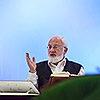Audio Version Of The Blog – 5/25/24
Listen to an Audio Version of the Blog
Download:MP3Audio

Listen to an Audio Version of the Blog
Download:MP3Audio
 “And then pray” means that everyone should examine himself and see how much effort he is giving to the society. Then, when he sees that he is powerless to do anything for society, there is room for prayer to the Creator to help him and give him strength and desire to engage in love of others (Rabash, Article 17, Part Two, “The Agenda of the Assembly”).
“And then pray” means that everyone should examine himself and see how much effort he is giving to the society. Then, when he sees that he is powerless to do anything for society, there is room for prayer to the Creator to help him and give him strength and desire to engage in love of others (Rabash, Article 17, Part Two, “The Agenda of the Assembly”).
Question: In the article “The Agenda of the Assembly,” Rabash writes that after a person has checked himself, realizes he has no strength, and turns to the Creator, he must think that his prayer has been accepted.
What does it mean? Is it that you don’t receive an obvious answer, but must think your prayer is accepted?
Answer: Nobody receives an explicit answer from above. It is just that when we put a lot of effort into getting closer to each other and clinging to each other, all together in this circle of friends trying to achieve some kind of joint effort, we begin to understand how important it is for us, how necessary it is, and, in general, how real it is.
Question: It seems to you that you turn to the Creator but do not receive an answer. That is, the friends do not become important in your eyes. Is it different from how it works when what you ask is what you get?
Answer: No, they become important. There is no such thing as “asked and received.” Gradually, the friends become closer and begin to feel that there is truly a connection between them. And then they can test it in their sensations.
[327866]
From KabTV’s “Practical Kabbalah” 4/4/24
Related Material:
The Reason for Appealing to the Upper Force
Waiting for an Answer
How Can You Recognize the Answer of the Creator?
 Question: Did Kabbalists like Baal HaSulam and Rabash seek to spread Kabbalah to the world to reduce the pressure on it?
Question: Did Kabbalists like Baal HaSulam and Rabash seek to spread Kabbalah to the world to reduce the pressure on it?
Answer: No, not for that reason. Kabbalists seek to present Kabbalah to the world so that it quickly comes to adhesion with the Creator in a good way because that is the best state for the world. But most importantly, because it is desirable to the Creator.
And although you feel very sorry for the world, this is not out of love for it, but primarily out of love for the Creator, because you must work more from the desire to give Him pleasure.
The same self-centered struggle is happening here: for what? Certainly not for oneself anymore. For the sake of the world or the sake of the Creator? And here arises such duality. After all, it is impossible to build a coherent action without all the components—me, world, Creator—being put together in the right packaging, since only then will they yield results. Therefore, it is necessary to work on their correct combination.
It is like aiming; you must align all axes so that your eye, the front sight, and the object are all on the same line. Then you hit the target. It is the same here.
[328621]
From KabTV’s “I Got a Call. How to Change the World for the Better?” 1/23/12
Related Material:
Why Does the World Need Kabbalah?
What Does Kabbalah Give To A Person?
Knowledge Of Kabbalah Is Indispensable
 To achieve Dvekut, they must achieve equivalence of form, meaning “As He is merciful, you, too, are merciful (Rabash, Article No. 16, 1984, “Concerning Bestowal”).
To achieve Dvekut, they must achieve equivalence of form, meaning “As He is merciful, you, too, are merciful (Rabash, Article No. 16, 1984, “Concerning Bestowal”).
Question: What does it mean, “as He is merciful”? It is not like I have the Creator before my eyes, and I understand what He does and take His example.
Answer: This is not necessary. The Creator’s actions do not matter to you. You must do them yourself rather than study what the Creator does. If you want to do something good for Him that pleases in feeling and action, then you must do it.
The essence of actions for the sake of the Creator is that if the Creator is great in your eyes, doing something for Him will bring you enjoyment because this is the purpose of creation.
Therefore, man’s task is to make the Creator great in his eyes. Since he does not know who the Creator is but knows His main property is bestowal, he must magnify this property.
It turns out that if the property of bestowal is essential in a person’s life, he can perform actions for the sake of bestowal and even enjoy them.
Question: Does the desire to become like the Creator lead me to pleasure?
Answer: If you desire it, then of course it leads to pleasure. You are happy, you enjoy it, you are proud of it.
[327777]
From KabTV’s “Practical Kabbalah” 3/28/24
Related Material:
What Can I Do for the Creator?
Kabbalah Teaches Us How To Receive In Order To Bestow
For the Creator’s Sake
 Question: What does it mean to seek the truth? After all, we know that a person always receives a desire from the Creator and through this desire seeks the path to the Creator.
Question: What does it mean to seek the truth? After all, we know that a person always receives a desire from the Creator and through this desire seeks the path to the Creator.
Answer: When a person actively engages in the work of correction, it accelerates their correction process and indicates that the person has matured.
Question: But does it matter that the desire itself is not yet corrected?
Answer: It will be corrected.
[329005]
From the Daily Kabbalah Lesson 5/7/24, Writings of Baal HaSulam “The Scrutiny of Bitter and Sweet, True and False”
Related Material:
Truth and Verity
Truth And Falsehood From The Perspective Of Kabbalah
Where Is The Truth?